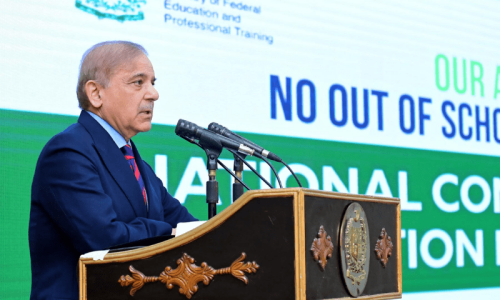• Permanent Court of Arbitration holds it is competent forum to mediate dispute over Kishanganga, Ratle projects
• Unanimous decision binding on all parties, cannot be appealed
• Foreign Office says Pakistan committed to Indus Waters Treaty
ISLAMABAD: In a major win for Pakistan, the Permanent Court of Arbitration (PCA) in The Hague on Thursday rejected India’s objections to its assumption of jurisdiction in a dispute between the neighbouring countries over the Kishanganga and Ratle Hydroelectric projects, pursuant to the Indus Waters Treaty.
Deciding in favour of Pakistan, the PCA ruled that it was indeed the competent authority to determine the Kishanganga dispute between Pakistan and India, sources in the Attorney General for Pakistan’s (AGP) office told Dawn.
Established in 1899 to facilitate arbitration and other forms of dispute resolution between states, the PCA is a non-UN inter-governmental institution that serves as a forum to address the dispute resolution needs of the international community.
“In a unanimous decision, which is binding on the Parties and without appeal, the Court rejected each of the objections raised by India and determined that the Court is competent to consider and determine the disputes set forth in Pakistan’s Request for Arbitration,” Reuters quoted a court statement as saying.
Pakistan was represented by a team of international experts, assisted by a team from the AGP office and included advocates Zohair Waheed and Leena Nishter, while Barrister Ahmed Irfan Aslam acted as Pakistan’s agent at the PCA.
The dispute pertains to concerns raised by Pakistan over India’s construction of the 330-megawatt Kishanganga hydroelectric project on the River Jhelum and plans to construct the 850MW Ratle hydroelectric project on the Chenab in Indian-held Jammu & Kashmir.
Islamabad initiated legal proceedings on Aug 19, 2016 by requesting the establishment of an ad hoc Court of Arbitration, pursuant to Article IX of the Indus Waters Treaty.
The step was taken after its concerns were raised before the Permanent Indus Commission in 2006 for the Kishanganga project, and 2012 for the Ratle project.
Pakistan then sought a resolution through government-level talks, held in New Delhi in July 2015. The decision to initiate proceedings came in response to India’s persistent refusal to address the concerns being raised.
The Indus Waters Treaty provides for two forums for settlement of disputes — the Court of Arbitration, which addresses legal, technical and systemic issues, or the Neutral Expert, which can address only technical issues. Pakistan requested the establishment of a Court of Arbitration, because it had systemic questions requiring legal interpretation, sources said.
India responded to Pakistan’s initiation of the formal dispute settlement process with its own belated request for the appointment of a neutral expert, which Islamabad maintained was a demonstration of New Delhi’s characteristic bad faith, they said.
Fearing conflicting outcomes from two parallel processes, the World Bank on Dec 12, 2016 suspended the processes for the establishment of a court of arbitration or the appointment of a neutral expert and invited both countries to negotiate and agree on one forum.
Pakistan and India could not, however, agree and the World Bank, after six years — during which India completed the construction of the Kishenganga project — finally lifted the suspension and created a court of arbitration and appointed a neutral expert.
Pakistan believes that any risk of conflicting outcomes can be arrested through coordination and cooperation between the two fora, the statement said.
Pakistan is engaging with both fora; in contrast, and in characteristic bad faith, India has boycotted the Court of Arbitration. In such a scenario, the court can proceed ex parte and is doing so.
According to Reuters, the court gave no details on when and how the case will continue, but added that it will address the interpretation and application of the bilateral Indus Waters Treaty, notably the provisions on hydro-electric projects, as well as the legal effect of past decisions of dispute resolution bodies under the treaty itself.
Following the PCA decision, the Foreign Office said that Pakistan was fully committed to the implementation of the Indus Waters Treaty, including its dispute settlement mechanism.
FO Spokesperson Mumtaz Zahra Baloch told a weekly press briefing on Thursday that the treaty was the foundational agreement between Pakistan and India on water sharing. “Pakistan remains fully committed to [its] implementation… we hope that India will also implement the treaty in good faith.”
Published in Dawn, July 7th, 2023














































Dear visitor, the comments section is undergoing an overhaul and will return soon.